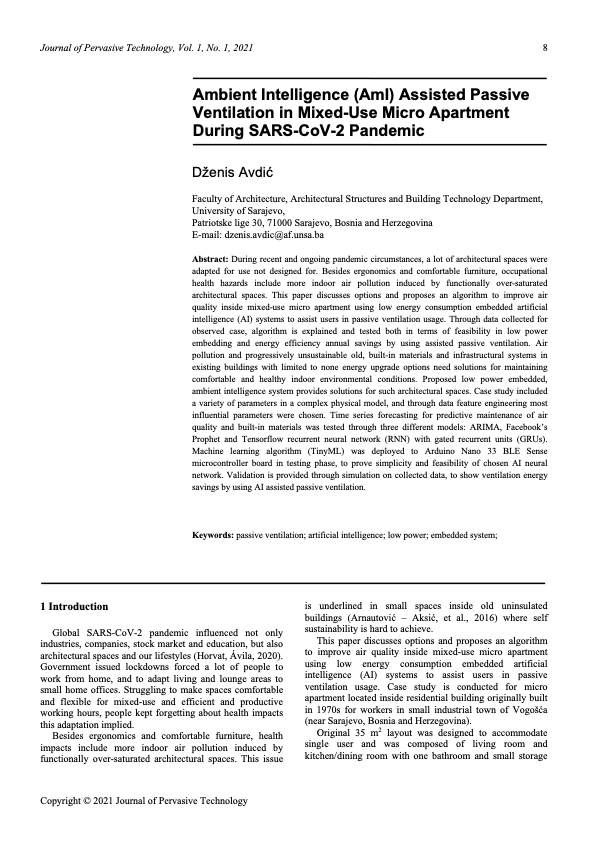Ambient Intelligence (AmI) Assisted Passive Ventilation in Mixed-Use Micro Apartment During SARS-CoV-2 Pandemic
Keywords:
Machine learning, ML, Artificial Intelligence, AI, Passive Ventilation, AI Assisted, Low Power Consumption, Embedded SystemsAbstract
During recent and ongoing pandemic circumstances, a lot of architectural spaces were adapted for use not designed for. Besides ergonomics and comfortable furniture, occupational health hazards include more indoor air pollution induced by functionally over-saturated architectural spaces. This paper discusses options and proposes an algorithm to improve air quality inside mixed-use micro apartment using low energy consumption embedded artificial intelligence (AI) systems to assist users in passive ventilation usage. Through data collected for observed case, algorithm is explained and tested both in terms of feasibility in low power embedding and energy efficiency annual savings by using assisted passive ventilation. Air pollution and progressively unsustainable old, built-in materials and infrastructural systems in existing buildings with limited to none energy upgrade options need solutions for maintaining comfortable and healthy indoor environmental conditions. Proposed low power embedded, ambient intelligence system provides solutions for such architectural spaces. Case study included a variety of parameters in a complex physical model, and through data feature engineering most influential parameters were chosen. Time series forecasting for predictive maintenance of air quality and built-in materials was tested through three different models: ARIMA, Facebook’s Prophet and Tensorflow recurrent neural network (RNN) with gated recurrent units (GRUs). Machine learning algorithm (TinyML) was deployed to Arduino Nano 33 BLE Sense microcontroller board in testing phase, to prove simplicity and feasibility of chosen AI neural network. Validation is provided through simulation on collected data, to show ventilation energy savings by using AI assisted passive ventilation.

Downloads
Published
Issue
Section
License
Copyright (c) 2021 Journal of Pervasive Technology

This work is licensed under a Creative Commons Attribution 4.0 International License.
Articles published under the Journal & Publisher management user license are protected by copyright. Users may access, download, copy, translate, text and data mine (but may not redistribute, display or adapt) the articles for non-commercial purposes provided that users:
- Cite the article using an appropriate bibliographic citation (i.e. author(s), journal, article title, volume, issue, page numbers, DOI and the link to the definitive published version on ScienceDirect)
- Maintain the integrity of the article
- Retain copyright notices and links to these terms and conditions so it is clear to other users what can and cannot be done with the article
- Ensure that, for any content in the article that is identified as belonging to a third party, any re-use complies with the copyright policies of that third party
- Any translations, for which a prior translation agreement with the Journal and the Publisher management have not been established, must prominently display the statement: "This is an unofficial translation of an article that appeared in an -Journal Title - of - SOZU Publisher management publication. The Journal and the Publisher have not endorsed this translation."
For permission to use documents beyond permitted here, contact editorial.
This is a non commercial license where the use of published articles for commercial purposes is prohibited. Commercial purposes include:
- Copying or downloading articles, or linking to such postings, for further redistribution, sale or licensing, for a fee
- Copying, downloading or posting by a site or service that incorporates advertising with such content
- The inclusion or incorporation of article content in other works or services (other than normal quotations with an appropriate citation) that is then available for sale or licensing, for a fee
- Use of articles or article content (other than normal quotations with appropriate citation) by for-profit organizations for promotional purposes, whether for a fee or otherwise.
- Use for the purposes of monetary reward by means of sale, resale, license, loan, transfer or other form of commercial exploitation.